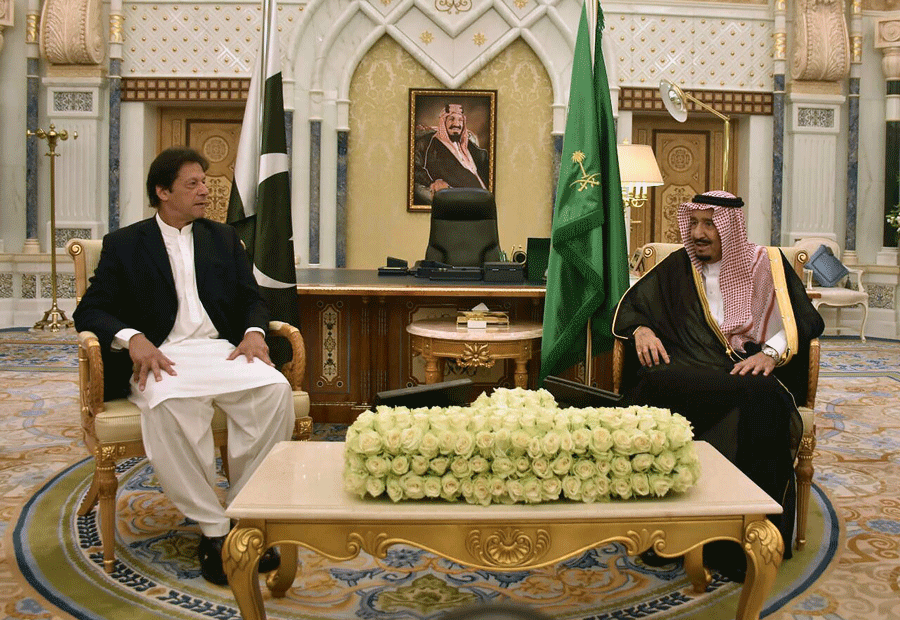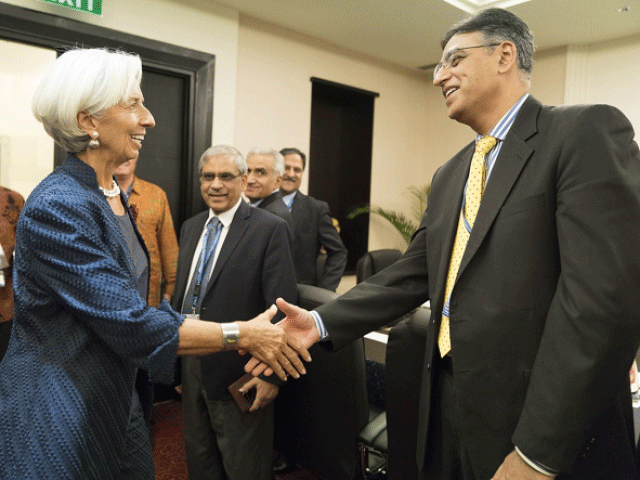Footing the Bill
By K. K. Shahid | Newsbeat National | Published 7 years ago

A royal handout: Prime Minister Imran Khan in a meeting with the Saudi King in Riyadh on the first day of the FII conference.
On October 23, Prime Minister Imran Khan addressed the Future Investment Initiative (FII) conference in Riyadh to underline both, the predicament Pakistan finds itself in, and the potential it has on the economic front.
“We are… trying to create an enabling environment for investment; we have this big resource lying outside Pakistan. The plan is to create an enabling environment in Pakistan so that we can attract not just foreign investors, not just overseas investors, but also our own investors,” said Khan.
PM Khan’s participation in the FIIC came in the backdrop of the killing of journalist Jamal Khashoggi, which prompted around 40 of the original 150 expected participants to boycott the event. Khan, however, underlined in an interview with the Middle East Eye, that Islamabad “cannot afford to snub the Saudis,” given Pakistan’s economic needs.
“The reason I feel I have to avail myself of this opportunity [to speak to the Saudi leadership] is because in a country of 210 million people, right now we have the worst debt crisis in our history,” Khan maintained.
PM Khan got what he was looking from the visit: Saudi Arabia gave Pakistan a $6 billion bailout package, half of which was earmarked as a one year-long support package to address the balance of payments, the other half for deferred payments on oil imports.
The package, it is believed, will help Pakistan negotiate its 13th bailout from the International Monetary Fund (IMF). The government is hopeful that a loan from China will further help Pakistan obtain better IMF terms. However, despite the temporary relief that the Saudi package has brought to the economy, the government will still have to address the country’s larger fiscal troubles in accordance with the conditions that IMF will set.
It was part of the preconditions for the IMF bailout due to which the rupee hit a new low last month, with the US dollar touching Rs 138 in midday trading on October 9, to eventually settle around 133. This is the fifth time in 10 months that the rupee has sunk to a new low against the US dollar.
The rupee had hovered around the Rs 104-105 mark against the dollar under the Pakistan Muslim League-Nawaz government until December last year, as part of then Finance Minister Ishaq Dar’s policy to artificially boost the rupee value.
“Ishaq Dar hired his own people in the State Bank of Pakistan to help pump dollars in the market, which artificially bolstered the value of the rupee,” said the government spokesperson on economy and energy, Farrukh Saleem. He continued, “$7-8 billion dollars were thrown in the market up to the point that only $17-18 billion remained in the State Bank reserves in February last year.”
The State Bank of Pakistan maintains for its part that the rupee price adjustment is owing to hikes in policy rates and the rising oil imports and their prices.

Limited choices for a debtor country: IMF MD Christine Lagarde meeting Finance Minister Asad Umar at the 2018 IMF/World Bank annual meetings in Bali.
Farrukh Saleem warns that with sanctions on Iran kicking in this month, those prices could further escalate. “The oil prices would increase, which could further impact the dollar price. More importantly, with growing fuel prices in Pakistan, everything else will inevitably become more expensive,” he added, underlining what he’s been saying all along in the various articles he has written that going to the IMF is inevitable for Pakistan, despite the incumbent government’s initial claims.
In a meeting with stockbrokers at the Pakistan Stock Exchange in Karachi on October 20, Finance Minister Asad Umar said the next IMF programme would be the last, owing to the policies that the government is implementing. The PML-N government’s outgoing Finance Minister, Rana Afzal Khan, questions these policies, claiming they do not actually exist.
“Where is the policy? There is no policy statement by the government, which is why there is chaos in the market and uncertainty in all sectors,” he said. “I have been trying to tell the government through my media talks that having dollars in hand is very important, so if they can get that loan from the IMF, they can retire the rupee loan – which is more expensive than the dollar loan. So far the restrictive measures on imports have yielded no returns. That has to be implemented very strictly.”
Veteran diplomat and former Foreign Secretary of Pakistan, Shamshad Ahmad says the government is missing the mark on the economic diplomacy front.
“There are four ingredients of economic diplomacy: investment, trade, loans and aid. Unfortunately Pakistani rulers have only focused on the latter two, without realising that these aren’t assets, but liabilities,” he contended, adding, “hence, the problem isn’t diplomatic, but more a matter of mindset. These loans make you surrender your sovereignty in its entirety. While Imran Khan has the right ideas, it’s his aides who are pushing him towards asking for loans. Imran Khan needs to get rid of those people who’ve been responsible for the financial turmoil in the country over the years — and they include some of the biggest industrialists.”
Shamshad Ahmad urges the government to reduce its own expenses to begin with. “The first thing is to reduce government expenditure, which he wants to do, but his aides have actually increased them further. I’ve been a bureaucrat for 40 years, and I know the needless expenses in bureaucracy. For instance, the concept of government cars does not exist anywhere in the world. Another example is the size of the secretariats in Pakistan – nowhere in the world are as many people employed in the secretariat,” he maintains.
Rana Afzal Khan says the government’s austerity drive hasn’t been executed the way it needs to be done. “The austerity drive should be done on a continuous basis and silently, because it impacts the people and then there is resentment. A sensible government would plan it and implement it discreetly through the budget.”
The former finance minister also urges a revamp of the energy sector and state-owned enterprises. “They need to come up with a very firm position on the state-owned enterprises. The only objection the opposition parties can raise is that the financial benefits for the people employed in those state-owned enterprises may be disturbed. I tried in my time to ensure that all employees of the steel mills would be adjusted in other government agencies,” he said.
Khan added, “They also would have to manage the energy sector. How can you continue with theft and losses? Since the PTI has formed the government in KP, Punjab and the centre, either the Distribution Companies (DISCOs) should be transferred to the provinces, or to enforce the payment
of bills, agencies should be created from within the energy management system.”


